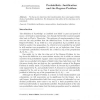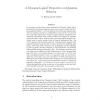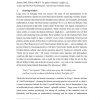SLOGICA
2008
13 years 4 months ago
2008
We discuss two objections that foundationalists have raised against infinite chains of probabilistic justification. We demonstrate that neither of the objections can be maintained....
SLOGICA
2008
13 years 4 months ago
2008
We study the proof-theoretic relationship between two deductive systems for the modal mu-calculus. First we recall an infinitary system which contains an omega rule allowing to de...
SLOGICA
2008
13 years 4 months ago
2008
We study a simple game theoretic model of information transfer which we consider to be a baseline model for capturing strategic aspects of epistemological questions. In particular,...
SLOGICA
2008
13 years 4 months ago
2008
In this paper we show how recent concepts from Dynamic Logic, and in particular from Dynamic Epistemic logic, can be used to model and interpret quantum behavior. Our main thesis ...
SLOGICA
2008
13 years 4 months ago
2008
SLOGICA
2008
13 years 4 months ago
2008
SLOGICA
2008
13 years 4 months ago
2008
SLOGICA
2008
13 years 4 months ago
2008
Logic is a celebrated representation language because of its formal generality. But there are two senses in which a logic may be considered general, one that concerns a technical a...
SLOGICA
2008
13 years 4 months ago
2008
SLOGICA
2008
13 years 4 months ago
2008
Psychologism in logic is the doctrine that the semantic content of logical terms is in some way a feature of human psychology. We consider the historically influential version of t...



